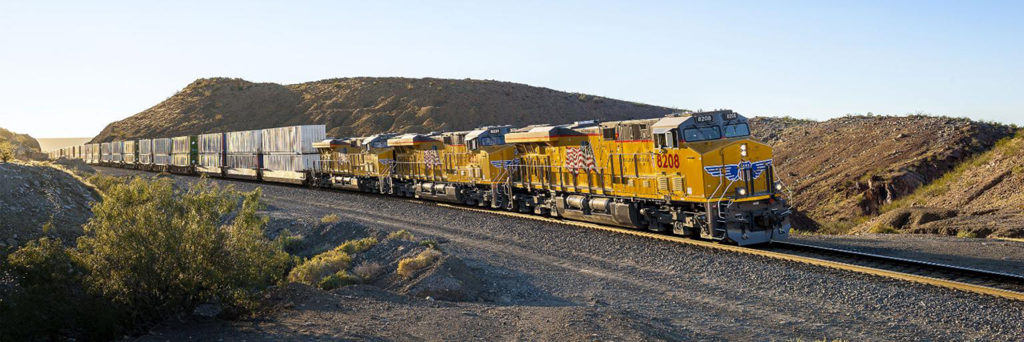
The Strange Case of STB Laryngitis
Written by Frank N. Wilner, Capitol Hill Contributing Editor
“I say, Watson, how long do you think we’ll be held here at the border? I have an important case to solve in Mexico!”
Sir Arthur Conan Doyle weaved mysteries as no other, with his protagonist detective, Sherlock Holmes, well-tuned to the significance (The Adventure of Silver Blaze) of a watchdog not barking when it should.
Another watchdog mysteriously not barking when it should is the Surface Transportation Board (STB) following the Biden Administration’s Dec. 17 halting of Texas cross-border rail operations of Union Pacific (UP), BNSF and Ferromex at Eagle Pass and El Paso. Mexico is the United States’ second largest export market, with more than one-third of North American cross-border traffic—including some 66% of U.S. agricultural exports to Mexico—transiting these now-closed border crossings.

The closings by U.S. Customs and Border Protection (CBP), an agency of the Executive Branch Department of Homeland Security, is preventing the international transit of 24 trains daily carrying, in addition to agricultural products, automotive parts, finished vehicles, chemicals and consumer goods. The impact on the U.S. economy, says UP, is in the hundreds of millions of dollars daily, with tens of thousands of railcars at full stop throughout the nation, forcing rail and rail shipper layoffs.
CBP says the closing is necessary for the safety and security of migrants, including unaccompanied children, crossing the border after climbing aboard and atop freight cars in Mexico—an assertion contested by railroads. Despite a recent surge of border-crossing migrants, UP says only five were found aboard its trains over the past five weeks.

While much of the globe heard barks from the Biden White House, Executive Branch Department of Transportation and the STB in the midst of, and following, a 2021 supply chain crisis affecting railroads, and again in 2022 when a nationwide rail work stoppage was imminent, those voices are now silent over a new emerging rail service reversal. Troublingly evident is that this latest rail service disruption threatening the North American supply chain is an intentional act of the Biden Administration.
By contrast, a looming rail strike in 2022 so concerned President Biden that despite his personally cherished “union Joe” image, he abandoned solidarity with rail labor to sign work-stoppage-blocking legislation, saying protection of the economy was a greater priority. Now, the Biden priority is repairing declining poll numbers attributed to alleged botched handling of the migrant crisis. Unsurprisingly, Transportation Secretary Pete Buttigieg has no quarrel, as he is a Biden Cabinet officer.
The STB, however, is independent of the Executive Branch and anointed by Congress as the primary watchdog monitoring rail network fluidity. Yet the bark of STB Chairperson Martin J. Oberman, so loud and frequent when prior rail service failures emerged, is suddenly silent as to the Biden Administration’s hobbling of rail service at Eagle Pass and El Paso. Similarly silent are Democratic STB members Robert E. Primus and Karen J. Hedlund and Republican members Patrick J. Fuchs and Michelle A. Schultz. Detective Holmes would consider politics a motive for the self-imposed muzzles.
Notwithstanding STB statutory independence, its five members (three Democrats and two Republicans) are tethered to the President. It is Biden who installed Oberman as chairperson; it is Biden who will decide if Primus or Hedlund succeeds Oberman, who will voluntarily depart the agency in early 2024; and it is Biden who will determine in 2024 whether to nominate Fuchs to a second term. Should Biden be re-elected in November, Schultz’ renomination in 2026 would be his choice. Independence, you see—as with notions of “fair”—is a flexible term residing in the eyes of the beholder.
That politics explains the instant absence of STB barking in response to the CBP shutting down crucial rail border crossings is reinforced by aggressive prior conduct. There was, for example, no STB laryngitis following post-pandemic railroad service failures.
Recall that in 2022, Oberman ordered—as is his statutory power to do so—the attendance of “senior” railroad officers to a public hearing that quickly dissolved into a public scolding. Each of the five STB members alternated in interrogating those rail officers out of concern over substandard rail service.
Oberman and Primus took the lead—Primus comparing rail service to military readiness and Oberman, a former trial attorney, grilling rail witnesses in resolute detail. CSX and Norfolk Southern, in a 10-page riposte, objected to the “tenor and tone.” And just recently, the Board unanimously threatened to use its regulatory authority to punish future rail service failures by forcing, through reciprocal switching, two-railroad competition at existing sole-served shipper facilities.
If the STB’s five members understand, as they have seemed to previously, that rail transportation is to the nation’s well-being as arteries are to the human body’s well-being, and that blockages of either must be prevented or cured immediately, then their onset individual and collective laryngitis is an intolerable dethroning of reason and dilution of the agency’s credibility. An explanation is owed.

Railway Age Capitol Hill Contributing Editor Frank N. Wilner, formerly an STB chief of staff and earlier assistant vice president for policy at the Association of American Railroads, is author of the newly published Railroads & Economic Regulation, available from Simmons-Boardman Books at www.transalert.com, 800-228-9670.



